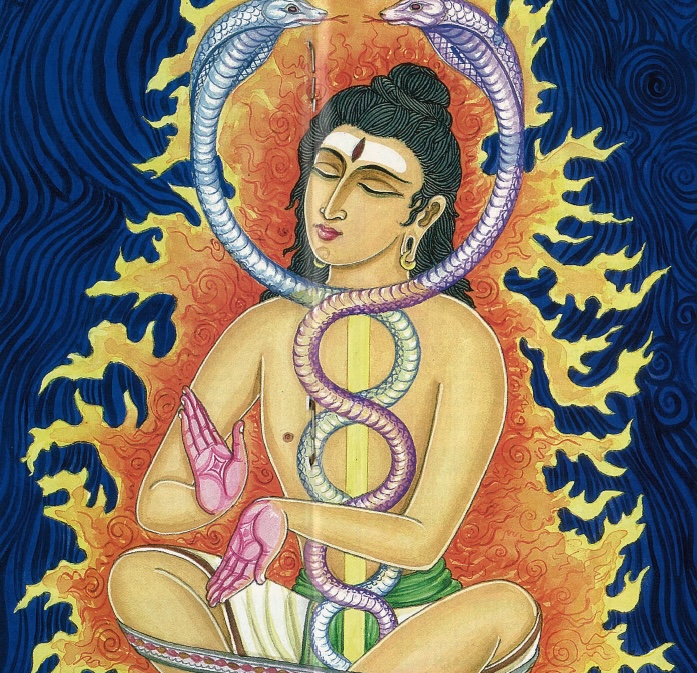THERE ARE TWO BASIC ENERGY CURRENTS WITHIN OUR SUBTLE BODY. THESE ARE IDA AND PINGALA, WHICH SURROUND A CENTRAL MAJOR CURRENT, SUSHUMNA. ¦THE IDA CURRENT IS FEMININE AND THE CHANNEL OF PHYSICAL-EMOTIONAL ENERGY. WHEN ENERGY IS FLOWING THROUGH IDA, WE ARE MORE CONSCIOUS OF THE PHYSICAL BODY. WE ARE NOT IN THE WORLD OF THOUGHT BUT IN THE WORLD OF FEELING. WE FEEL STRONGLY AND EXPERIENCE STRONG EMOTIONS. ¦THE PINGALA CURRENT IS MASCULINE AND THE CHANNEL OF INTELLECTUAL-MENTAL ENERGY. WHEN ENERGY IS FLOWING THROUGH THE PINGALA, WE ARE AWARE IN THE MIND. WE ARE INQUISITIVE. WE LIKE TO TALK A LOT. WE TEND TO ARGUE AND TO REASON. ¦SUSHUMNA IS THE CENTRAL ENERGY CURRENT, RISING THROUGH THE SPINE UP TO THE CROWN OF THE HEAD. THE LIFE FORCE WITHIN THE SUSHUMNA BECOMES VERY POWERFUL WHEN THE IDA AND PINGALA FORCES ARE BALANCED. THROUGH YOGA, THE KUNDALINI ENERGY IS AWAKENED AND MADE TO RISE UP SUSHUMNA THROUGH EACH CHAKRA TO THE SAHASRARA AT THE TOP OF THE HEAD.
SCRIPTURES, SAINTS AND SCHOLARS ON THE IDA, PINGALA AND SUSHUMNA CURRENTS
The sushumna ascends upward and conducts prana. It is separated between the two sides of the palate. Uniting the prana with the syllable Om and the mind, the yogi ascends upward. And as he turns the tip of his tongue towards the palate and collects the sense-organs into a unity, he sees greatness. Through that he attains to the state of selflessness, and does not participate in joy or sorrow.
Krishna Yajur Veda, Maitrayana Upanishad 20
Where on the left guards ida and on the right the pingala. Between them is the chief spot. He who knows it, knows the Veda. Dustless, entering into Brahman, the sushumna is related to it. It’s the pillow on which rest the 72,000 arteries.
Atharva Veda, Kshurika Upanishad 16-17
When the breaths of ida-moon and pingala-sun course their way unhindered through the spinal channel, your body will be imperishable, and abiding joys shall arise even here in this world below. This is the true way of Siva yoga.
Tirumantiram, verse 883
The yogi ascends along the sushumna from chakra to chakra. The ascent is made gradually by patient efforts. Even a mere shaking of the opening of sushumna causes a great deal of bliss. You become intoxicated. You will entirely forget the world. When the opening of sushumna is shaken a bit, the kundalini shakti tries to enter sushumna. Great dispassion comes in. You will become fearless. When the sushumna nadi is working, i.e., when the breath flows through both the nostrils, meditation proceeds with ease and joy. The mind then is calm. When the mind is in the sushumna, the yogi is shut out from the objective, physical consciousness of the world. He is practically dead to the world, sees various visions and moves in the mental, ethereal space. Samadhi starts.
Swami Sivananda
The ida and pingala nadis govern, on the physical level, responses of the sympathetic and parasympathetic nervous systems. Through controlled breathing in which life force is guided along the pingala, yogis can speed up their heart rate and metabolism and improve eyesight and hearing. And, through controlled breathing in which the life force is conducted along the ida, yogis can greatly slow down their metabolism. This can be pushed to the point where expert yogis can remain underground in an airtight container for hours, even days.
Georg Feuerstein, in his new tome, The Yoga Tradition
A curious correlation to the ida, pingala and sushumna currents is found in the caduceus. In Greek mythology, the caduceus was a winged staff with two serpents twined around it, carried by Hermes, messenger of the Gods, as a symbol of peace. Romans believed serpents discovered the secret of eternal life, interpreting shedding of skin as a return to youth. In modern times the caduceus has been adopted as the physician’s symbol and as the emblem of the US Army Medical Corps.


